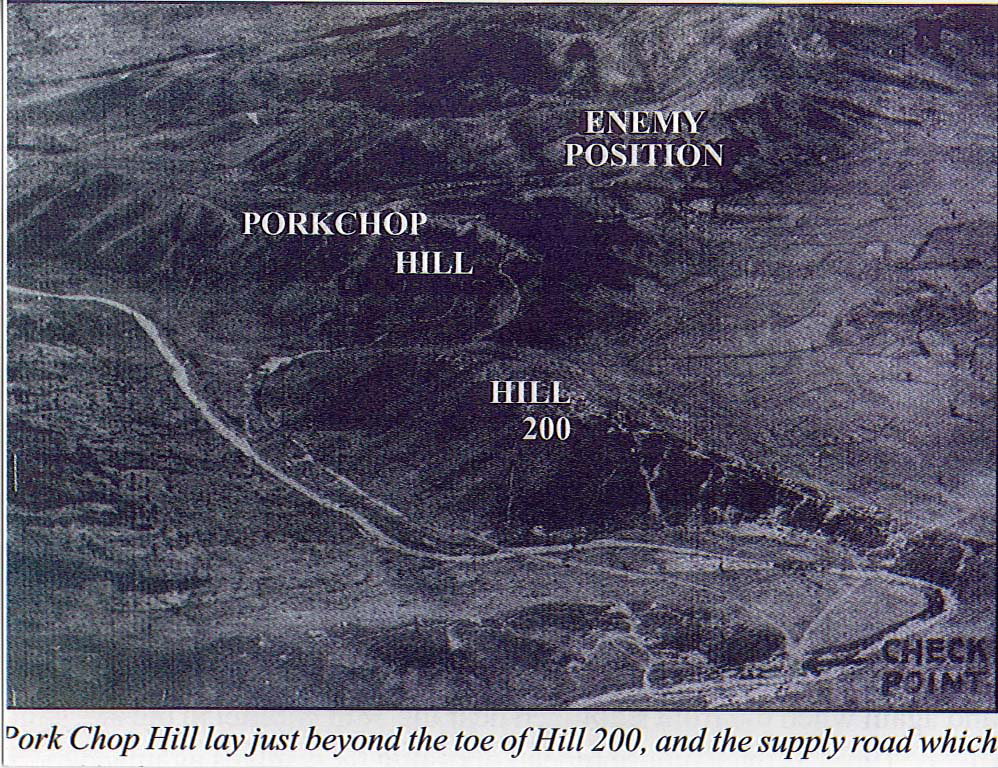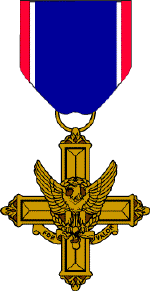

FIT TO COMMAND!-- 22 April 2006
By Joe Clemons, USMA '51
I will talk about classmates – some anecdotes humorous, some
serious. I’ll talk about leadership – of our classmates, of other classes,
of Black Jack Pershing in WWI, and some who served with him, of some
modern day examples, finally, I’ll talk about my choice for distinguished
graduate.
On the humorous side right after graduation, at Ft
Benning, Walt Russell, Arlie Sherman and I rented a little apartment from
a man named Firm Roberts who advertised the coldest beer in Georgia. All
we knew how to cook were steaks and fried chicken. The one whose turn it
was to fry the chicken always wore a poncho to protect himself from the
splattering grease. Ingenuity in action.
Years later after the
Korean War – in 1958 – Cecil and I were ordered to Hollywood for six
months duty as a technical adviser for the movie, Pork Chop Hill. At the
time I was a rifle company CO in the 101st Abn Div as was Shy Meyer. He
and Carol volunteered to take care of our black standard female poodle
while we were gone. A few months later, in Hollywood, we received a
telegram: “Priss had nine pups this morning. All doing well. Love, Aunt
Carol and Uncle Shy.” And they didn’t even have a dog.
While we
were there, one morning Cecil arrived at the studio, perspiring freely,
all upset. When I saw her, I figured that she had had a wreck with our
car. Not so. On her way she had pulled up to a stoplight next to Clark
Gable in his Maserati convertible. She managed to keep abreast of him for
six blocks, shouting,” I’ve seen Gone With the Wind Ten
Times.”
Back to reality. When Ted Atkeson asked me to make this
talk, I asked for suggested topics. He mentioned the art of leadership –
what it is and how some people have attained the necessary skills. Or talk
from your own experiences, describing strengths and weaknesses you have
witnessed along the way, perhaps identifying the officers or people you
have come to admire for some particular trait you have noticed.
So,
for my research, I turned to Andy Chacon’s list of Our Generals – some
thirty of our classmates who wear stars. And at the top of the list were
three infantry officers with four stars: Shy Meyer, Bill Richardson, and
Roscoe Robinson. I had served with Shy in the 101st Abn Div under Gen
Westmoreland. We were both rifle company commanders in the same battle
group. I had served with Bill Richardson in the Pentagon in the Asst Vice
Chief of Staff’s office when we were both newly promoted colonels and
again in Viet Nam when I turned over to him command of the 198th Brigade,
Americal Div in 1970. Roscoe Robinson and I were in the same infantry
battalion in the 31st Inf, 7th Inf Div during the Korean War. Later we
served together at the Airborne Dept, The Infantry School as instructors
in the Pathfinder Committee. Looking back on this service with these three
four star generals, I tried to note the necessary skills that enabled them
to reach the pinnacle of stardom, so to speak. They were all three
hard-working and capable – Shy was an outstanding golfer, Bill was an
outstanding tennis player, and Roscoe was an outstanding handball player.
So go figure!
On the serious side, while I commanded the 198th
Infantry Brigade in Vietnam, one of the outstanding Bn CO’s was a LTC
named Norman Schwartzkopf. He was a large man who filled up the small LOH
(light observation helicopter) assigned to BN CO’s for transport. He had a
can-do attitude and a cheerful countenance, two important leadership
qualities. Later, as commander of Desert Storm forces he was sometimes
known as Stormin’ Norman. I like to say that I trained him right.
Incidentally, he thought leadership is an art not a science.
My
younger son, Gordon, gave me a book for Christmas titled “ To The Last
Man” written by Jeff Shaara. It is about World War I and he bases his
narrative on four principal characters: General John “Black Jack”
Pershing, a young Marine rifleman , a pilot named Raoul Lufberry, and the
Red Baron, Manfred von Richthofen. I always wondered where the nickname
“Black Jack” came from. According to the author, it derived from his
command of a Negro unit in the 10th Cavalry in Montana. The horror of
fighting in the trenches is seen through the eyes of Roscoe Temple, the
Marine, as he fought in the battles of Chateau Thierry, Belleau Woods and
Verdun.
For you pilots in the class, I think you would be
interested in the description of aerial combat from the standpoint of an
American, Raoul Lufberry, serving with the French escadrille against von
Richthofen and the German forces. Neither survived the war, both being
shot down.
The author describes the difficulties Pershing had with
his French and British counterparts who wanted to use the fresh American
troops as replacements for the British and French. To his credit Pershing
insisted that they fight as an American Expeditionary Force with their own
sector of operations.
Under Pershing’s command was LTC George
Patton, who he assigned to the tank forces. In the battle of the
Meuse-Argonne, Sept 26, 1918, Patton was in charge of a brigade of tanks –
some 140 Renault tanks, each with a driver and a gunner. Patton’s
commander had ordered him to stay well behind the advancing tanks in a
command post that depended on runners to deliver orders to the tank
platoons and carrier pigeons to keep his higher HQ informed. Of course,
Patton couldn’t stay behind and ended up with the attacking elements,
shrouded in thick fog. He led the successful attack but sustained a
serious leg wound. Nonetheless, he stayed in the battle for three hours
before being evacuated. His commander, rather than being displeased at his
ignoring his orders recommended that he be promoted to colonel and receive
the Distinguished Service Cross.
To digress. Recently at a Lenten
service that Cecil and I attended, the Reverend Gray Temple talked about
how Jesus, an ordinary human at the beginning of his ministry, was able to
persuade the fisherman to throw down their nets and follow him to be
fishers of men. The priest described growing up on the Carolina coast
where the fishermen were rough men, smoking, using profanity. His father
forbade him to have anything to do with them. He describes one fisherman
smoking a cigar who to show how tough he was, put the cigar out in the
palm of his hand and then popped it in his mouth and chewed it. Then
comparing this type of person to the fishermen at Galilee, Rev Temple
offered that it was Jesus’ command presence that inspired Simon and Andrew
and James and John to throw down their nets and follow him. Command
Presence!
Gray Temple then turned to an article by Garrison
Keillor, entitled “Fit To Command” and read the following compliments for
the military that few priests offer: “I met a West Point cadet once, and
in her I could see what I’d missed out on, a keenness of focus, a great
sense of poise. She embodied the word “capable.” I would’ve followed her
into a burning building. Had she skipped the Army and swanned around
amongst the perpetual adolescents, she might have missed out on her life
entirely.
Whenever I meet military men and women, I’m struck by
their bearing and temperament. I sit down to dinner with a Marine captain
just back from Iraq and immediately feel a little childish in his
presence, though he’s 30 years younger. He is friendly, polite and
tremendously focused. What might appear at a distance to be rigidity is
really heightened attentiveness. Everything he says is appropriate and
precise. When you ask about his experience in Iraq, he tells you, without
spinning the story. He is no tin soldier, no flag waver. There’s no
bombast in him. Like dancers, or pilots, or violinists, or lion tamers, he
is a man trained to operate consistently at a high level of
attention.”
So what were the common traits of these outstanding
leaders: Myer, Richardson, Robinson, Schwartskopf, Pershing, Patton, the
West Point cadet, the Marine captain? Command presence and fitness to
command!!
And, finally, I want to tell you about my distinguished
graduate, my classmate, my brother-in-law, Walt Russell. He and I were
both in the same division in Korea – different regiments. In the April
1953 battle for Pork Chop Hill, his company was sent up on the hill to
reinforce my unit.
We’ve never told anyone about the following
incident. We were checking the trenches and bunkers when we found several
men in the large bunker on the reverse slope of the hill used to feed the
troops. We told them to move up to fighting positions on the hill. They
declined to move, We gave them direct orders which they declined to obey.
So we pulled out our 45 cal pistols and threatened to shoot them if they
didn’t move. As I remember from our training here we were told that this
is a last recourse and don’t use it unless you’re prepared to shoot. I
don’t think that either of us would have shot but it worked and the men
moved up the hill.
Walt and I both got through the Korean War
unscathed but in Vietnam with the First Air Cav Walt was wounded in the
head while flying a helicopter on one of their first operations in October
of 1965. His life was saved by flying him to a MASH hospital with a
neurosurgeon. He then spent a year in the hospital at Walter Reed. His
doctor told him when he was discharged from the hospital that he would
spend the rest of his life in a wheelchair. Well, Walt determined to make
that man eat his words. With a brace on his leg and his paralyzed left arm
in a sling, Walt graduated from Emory law school in Atlanta with a law
degree.
As he left Washington to go to Atlanta, George Meighen
showed up for Walt’s send-off in a Daddy Warbucks mask to match Walt’s
shaved head that resulted from the plate implanted in his head. Walt was
also wearing shoes with Velcro closures and George wanted to know where he
got those fruity Pilgrim shoes.
Well, Walt was elected to the
Georgia state legislature twice and to the DeKalb County commission in
Atlanta as Chairman. After that he continued to practice law until his
retirement. I remember seeing a photograph of Walt in the Georgia state
legislature holding up a Navy B-robe he’d won from Jimmy Carter who I
think was probably governor at the time.
I have never heard Walt
complain about his wound and handicap. To me Walt exemplifies the traits
of leadership, is a distinguished graduate and a true hero.
(Joseph G. Clemons, Jr. Colonel Retired, USA {Cullum 18024}{DSC})
God Bless America
Joseph G.
Clemons, Jr. Colonel Retired, USA {Cullum 18024} was my candidate for the
Distinguished Graduate Award and he got it, by golly.



